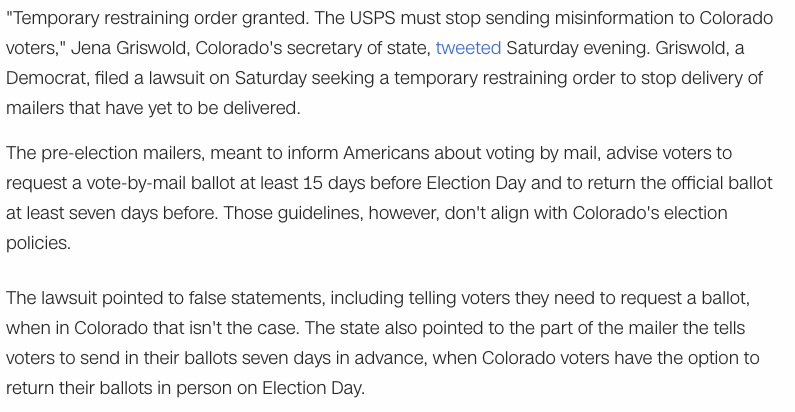Last week, @USPS sent postcards to some voters that offered tips for voting by mail. But, since every state has different rules for voting by mail, some of these tips don’t apply to voters in each state.
https://twitter.com/JenaGriswold/status/1304607922719088640?s=20
Colorado sends every voter a mail-in ballot. So, voters do NOT need to request a ballot, despite @USPS' recommendation to request ballots 15 days before the election. 9news.com/article/news/p…
Although some voters have already received the @USPS mailer, Colorado filed a lawsuit and restraining order against @USPS to avoid worsening confusion. A federal judge has now banned USPS from sending similar mailers until September 22. cnn.com/2020/09/13/pol… 

In Rhode Island, the mailer proved to be inaccurate AGAIN. According to @RISecState, voters must request their mail-in ballots 21 days before an election, NOT 15.
https://twitter.com/RISecState/status/1305220250301063169?s=20
In Nevada, Secretary of State Barbara Cegavske pointed out that Nevada voters don’t need to request their ballots, add postage to ballots, or mail their ballots back a week before the election. thenevadaindependent.com/article/sos-ma…
As long as ballots in Nevada are postmarked by November 3, they will be accepted. thenevadaindependent.com/article/sos-ma…
We could go on listing examples of why these tips are misleading, but we think you get the point. 💡 Since every state has different rules and deadlines for elections, it’s always best to go straight to your state or local board of elections for information. 💡
If you’re looking to learn more about the different election rules in every state, check out our How to Vote In Every State series with @ComplexlyMedia, starting with our COVID-19 voting changes explainer.
• • •
Missing some Tweet in this thread? You can try to
force a refresh









